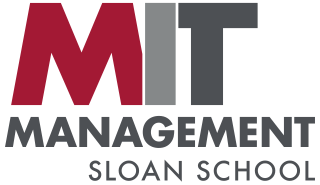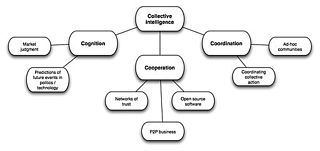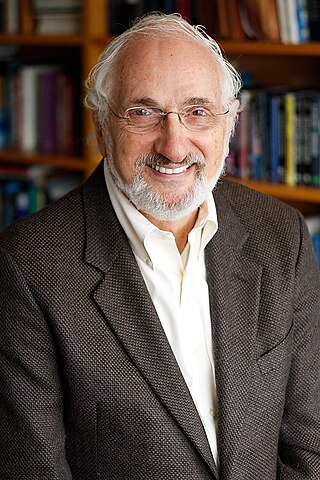
The MIT Sloan School of Management is the business school of the Massachusetts Institute of Technology, a private university in Cambridge, Massachusetts. MIT Sloan offers bachelor's, master's, and doctoral degree programs, as well as executive education. Its degree programs are among the most selective in the world. MIT Sloan emphasizes innovation in practice and research. Many influential ideas in management and finance originated at the school, including the Black–Scholes model, the Solow–Swan model, the random walk hypothesis, the binomial options pricing model, and the field of system dynamics. The faculty has included numerous Nobel laureates in economics and John Bates Clark Medal winners.

James Michael Surowiecki is an American journalist. He was a staff writer at The New Yorker, where he wrote a regular column on business and finance called "The Financial Page".

The Wisdom of Crowds: Why the Many Are Smarter Than the Few and How Collective Wisdom Shapes Business, Economies, Societies and Nations, published in 2004, is a book written by James Surowiecki about the aggregation of information in groups, resulting in decisions that, he argues, are often better than could have been made by any single member of the group. The book presents numerous case studies and anecdotes to illustrate its argument, and touches on several fields, primarily economics and psychology.

Thomas W. Malone is an American organizational theorist, management consultant, and the Patrick J. McGovern Professor of Management at the MIT Sloan School of Management.
Mass collaboration is a form of collective action that occurs when large numbers of people work independently on a single project, often modular in its nature. Such projects typically take place on the internet using social software and computer-supported collaboration tools such as wiki technologies, which provide a potentially infinite hypertextual substrate within which the collaboration may be situated. Open source software such as Linux was developed via mass collaboration.
Enterprise social software, comprises social software as used in "enterprise" (business/commercial) contexts. It includes social and networked modifications to corporate intranets and other classic software platforms used by large companies to organize their communication. In contrast to traditional enterprise software, which imposes structure prior to use, enterprise social software tends to encourage use prior to providing structure.

Wikinomics: How Mass Collaboration Changes Everything is a book by Don Tapscott and Anthony D. Williams, first published in December 2006. It explores how some companies in the early 21st century have used mass collaboration and open-source technology, such as wikis, to be successful.
Collective wisdom, also called group wisdom and co-intelligence, is shared knowledge arrived at by individuals and groups.
Decentralized decision-making is any process where the decision-making authority is distributed throughout a larger group. It also connotes a higher authority given to lower level functionaries, executives, and workers. This can be in any organization of any size, from a governmental authority to a corporation. However, the context in which the term is used is generally that of larger organizations. This distribution of power, in effect, has far-reaching implications for the fields of management, organizational behavior, and government.
The MIT Center for Collective Intelligence (CCI) is a research center at the Massachusetts Institute of Technology, headed by Professor Thomas W. Malone, that focuses on the study of collective intelligence.

Collective intelligence (CI) is shared or group intelligence (GI) that emerges from the collaboration, collective efforts, and competition of many individuals and appears in consensus decision making. The term appears in sociobiology, political science and in context of mass peer review and crowdsourcing applications. It may involve consensus, social capital and formalisms such as voting systems, social media and other means of quantifying mass activity. Collective IQ is a measure of collective intelligence, although it is often used interchangeably with the term collective intelligence. Collective intelligence has also been attributed to bacteria and animals.
Paul J. H. Schoemaker, Ph.D. is an academic, author, and an expert in the fields of strategic management and decision making.
Satish Nambisan is the Nancy and Joseph Keithley Professor of Technology Management at the Weatherhead School of Management, Case Western Reserve University.
Jonathan Spector is the former president and CEO of The Conference Board, and currently a senior advisor to the organization.

Andrew Paul McAfee, a principal research scientist at MIT, is cofounder and codirector of the MIT Initiative on the Digital Economy at the MIT Sloan School of Management. He studies how digital technologies are changing the world.

Jeanne Wenzel Ross is an American organizational theorist and principal research scientist at MIT Sloan School of Management and the MIT Center for Information Systems Research (CISR), specializes in Enterprise Architecture, ICT and Management. She is known for her work on IT governance, and Enterprise architecture.
Jagmohan Raju is an American marketing professor and author. He is the Joseph J. Aresty Professor and Director of the Wharton-Indian School of Business Program at Wharton Business School, University of Pennsylvania. Professor Raju is internationally known for his research on Pricing. He is the author of the book Smart Pricing.

Jerry (Yoram) Wind is The Lauder Professor and Professor of Marketing at The Wharton School of the University of Pennsylvania, and is the founding director of the Wharton "think tank,” The SEI Center for Advanced Studies in Management. He is internationally known for pioneering research on organizational buying behaviour, market segmentation, conjoint analysis, and marketing strategy. He consults with major firms around the world, provides expert testimony in many intellectual property and antitrust cases, and has lectured in over 50 universities worldwide.

Yaniv Altshuler, is an Israeli computer scientist and entrepreneur. He is a researcher at the MIT Media Lab, at the Human Dynamics group headed by professor Alex Pentland.

Damon Centola is a sociologist and the Elihu Katz Professor of Communication, Sociology and Engineering at the University of Pennsylvania, where he is Director of the Network Dynamics Group and Senior Fellow at the Leonard Davis Institute of Health Economics.











